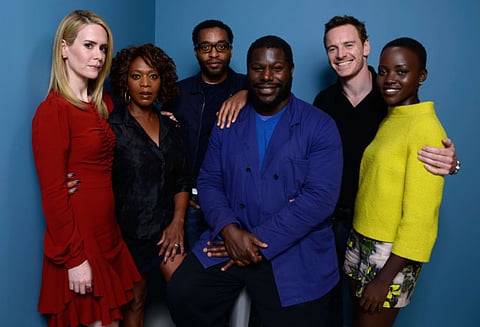Steve McQueen on 12 Years A Slave: ‘It’s not about sugarcoating history’
With his film, 12 Years A Slave, “we’re here to do something that we feel is necessary”

Steve McQueen has explained in more detail both the intentions and genesis of his film 12 Years a Slave, which has premiered to huge applause - and a smattering of appalled walkouts - at the Toronto film festival.
At a press conference for the film, McQueen reported how he’d been planning to make a film about a freeman sold into slavery when he came across Solomon Northup’s real-life memoir. McQueen compared the book to The Diaries of Anne Frank, which was published a century later. “I was upset with myself that I didn’t know this book and then I realised no one I knew knew about it. No one. As soon as [my wife] put it in my hand I didn’t let it go, it was just remarkable. I had an idea and then you see it in your hand as a book. Amazing.”
Although there have been books and other media about the subject, McQueen was driven by a desire to immerse people in the visuals of slavery. “When you see the ins and outs of it, it does something different. And if that starts a conversation - wonderful, excellent.”
Reacting to those who found the film’s depictions of violence too much to stomach, star Michael Fassbender explained that documented history had left them with no choice. “It’s easy. We were just there to facilitate. What’s tricky is when people try to sugarcoat it or start messing with it. It is what it is.”
The film’s lead, Chiwetel Ejiofor, agreed: “To not show it as explicitly as we can would I think be a disservice to [Northup] and his family. What’s the point in telling the story if we couldn’t tell the story?”
McQueen remained impatient with those who found the film unpalatable. “From the response in Toronto, people want [this realism]. Everyone’s an adult here; they know how to deal with it. It’s not about sort of sugarcoating it. We’re here to do something that we feel is necessary.”
As well as setting out his stall, McQueen was also eager to expand the scope of the film’s ambitions beyond race and slavery. “This film for me is about love,” he said, also referring to the movie as “a discussion about human dignityIt’s a fight for soul, it’s a war for his spirit. It’s a very silent war, but a war none the less.”
Sign up for the Daily Briefing
Get the latest news and updates straight to your inbox

